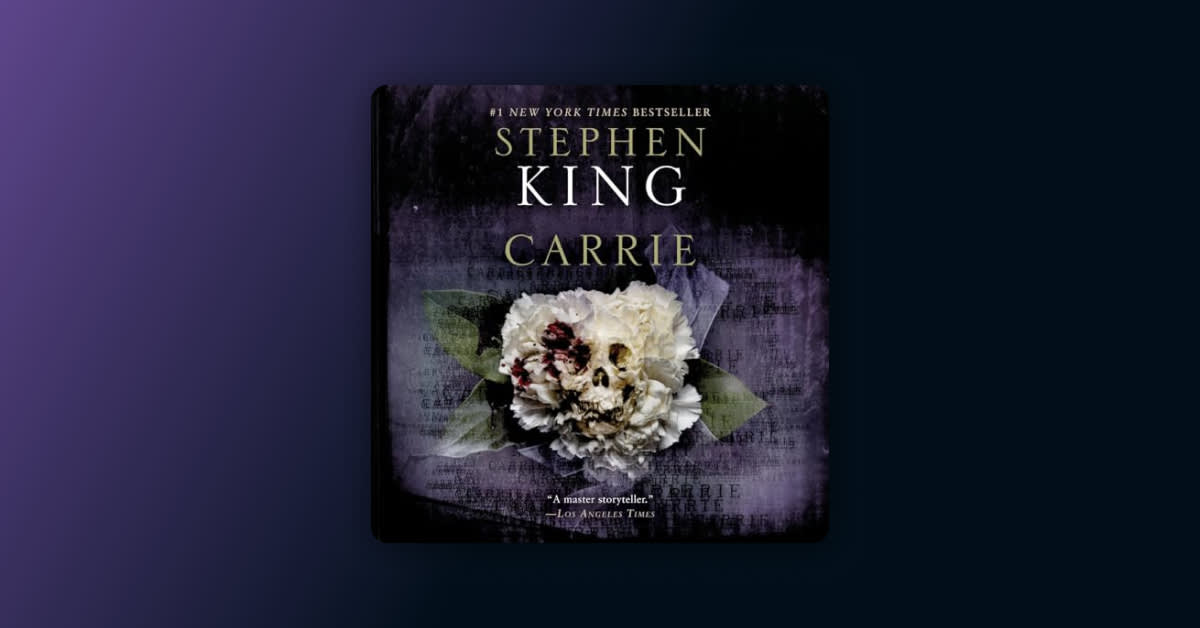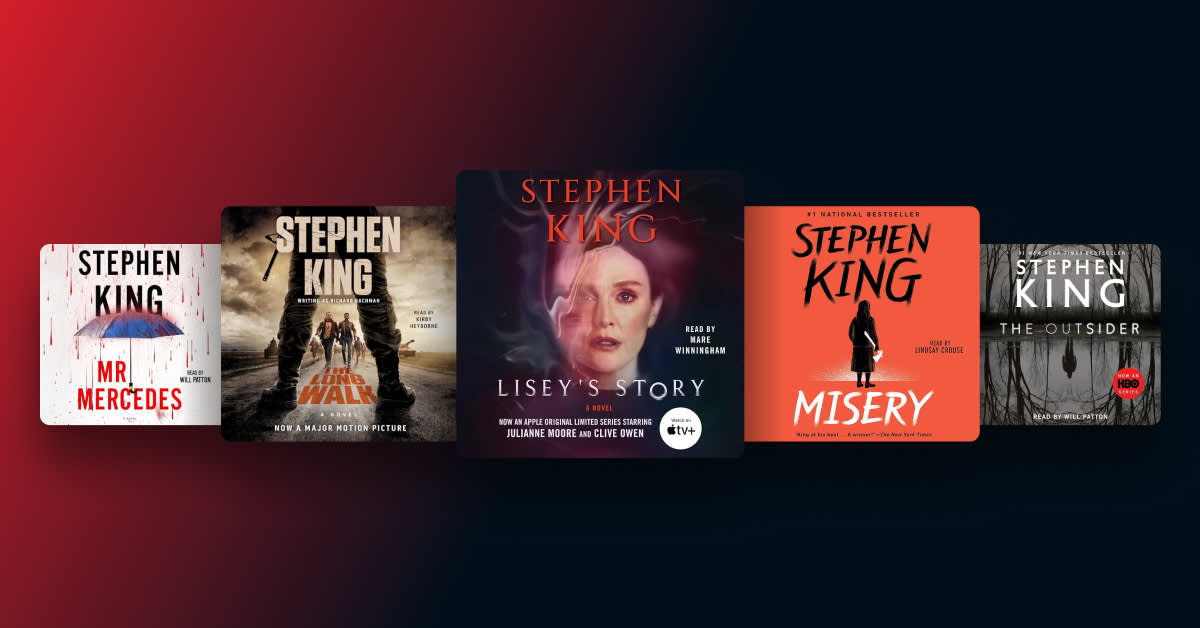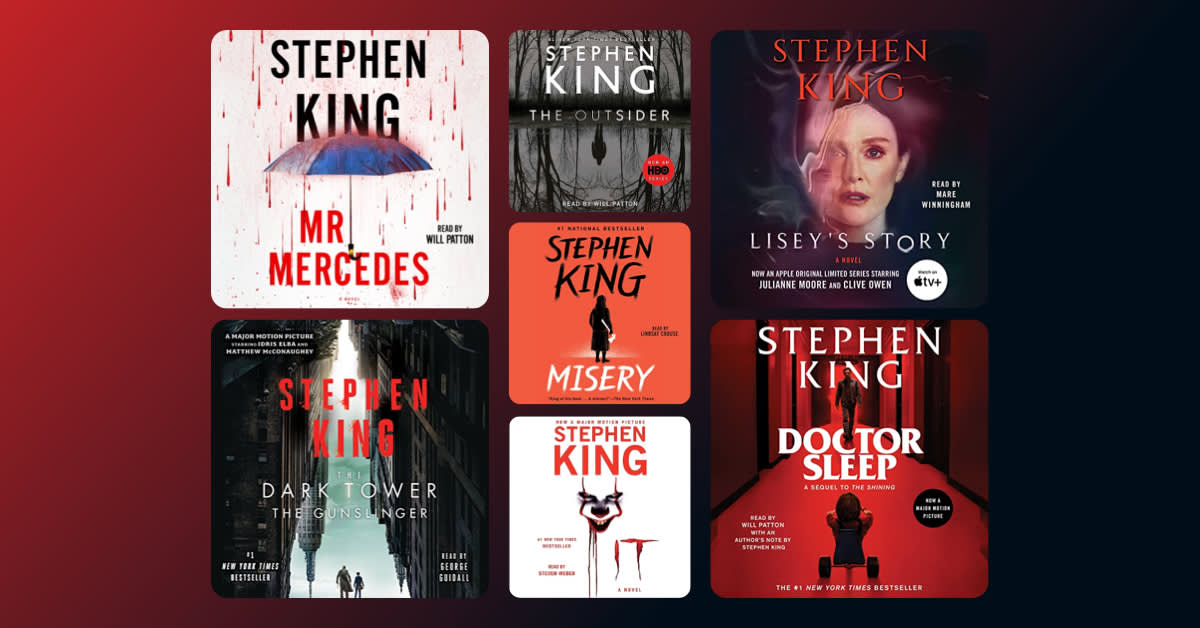Why it’s essential
Carrie not only launched the career of Stephen King—it became an immediate cultural phenomenon upon its release in April 1974. Sparking conversation at every level of society, not to mention a blockbuster movie adaptation, Carrie offered sly commentary on the social issues of the time while delivering a truly terrifying tale of abuse and revenge.
Featured in: The top 100 classics of all time.
What is Carrie about?
Carrie is the story of an awkward teenage girl growing up in a house ruled by a devout Christian mother and who suffers shocking abuse both at school and at home. Her budding telekinetic powers, however, give her a sliver of confidence … until an act of cruelty pushes her over the edge into a fury of revenge.
Editor’s review
Steve is a picky listener who usually realizes later than he should that he loves genres he thought he wouldn’t get into.
It’s staggering to consider that Stephen King’s Carrie is 50 years old this month. Margaret Atwood reminded me, in a recent paean to the novel in The New York Times, how vital the book was, and still is. I read it when I was close in age to the characters in the story, when Carrie was the talk of the hallways in middle school. I wanted to show I was cool—and yet, I was worried it might be a bit too much to handle. (I kept hearing about the mysterious "shower scene.") I was not exactly wise for my years, but my curiosity got the best of me.
Just a few pages in, I was hooked. And to say it affected me is an understatement—Carrie shook me to my core. Of course, there was the story, practically dripping with forbidden topics. It had sex! And blood! And telekinesis! And violence! And yes, that shower scene lived up to the hype. Dang, could high school kids really be that mean and awful? Oh, what little I knew. And I have to note that, as an uber-closeted gay kid desperate to keep my true feelings hidden, Carrie’s plight spoke to me in ways no other protagonist had. The shame and loathing she felt about who she was, the lack of family or friends to confide in, the inklings of attraction for a boy who is completely out of her league, the sliver of hope that she will fit in … oh my god, the waves of recognition and empathy crashed over me, page after page.
But what unsettled me even more was the verisimilitude King brought to his storytelling. The places felt lived in, familiar, with details I could almost touch. The people felt real, with unique personalities, quirks, and flaws. They were bold and alive in a way I envied. And King kept tightening the tension with a riveting device, interrupting the narrative at regular intervals to jump into the past or the future, citing a snippet of a (real-sounding) news item or scholarly report about something dreadful that happened to these people. He lets us know this is not going to end well—characters we care about are not going to survive—but he paves a path we are powerless to avoid.
King’s final masterstroke, I think, is to precede the mass destruction with an almost unbearable moment of hope. After all that Carrie has endured, she pushes past her fears and her mother’s violent protests, and takes a bold chance—she buys that red velvet, makes that dress, and goes to that prom with Tommy Ross. Their few moments together are genuinely sweet and touching, and the "what could have been" bliss lulls us just before the world goes to hell. King gives you a moment to relax and smile … and then smacks it off your face. Even though you knew it was coming, the violence that follows is all the more shocking, and the toll it takes hits all the harder.
I returned to Carrie this month, listening instead of reading this time. I was astonished at how sharp the story remains. King was at the top of his game out of the gate—his now-trademark psychological depth, forensic attention to detail, obsession with popular culture, and inexhaustible imagination already in full flower. And the themes are as timely as ever. While ostensibly just a horror story, and at just over seven hours, among King’s shortest listens, Carrie covers a lot of ground. King addresses child abuse and bullying, women’s empowerment and misogyny, religious extremism, class struggles, and media obsession with tragedy—all issues that are at least as relevant today as they were in the early 1970s.
Of course, not all of Carrie is timeless. Some of King’s attempts at teen slang sound hopelessly dated, and the jarring inclusion of a few casual racist comments would be unthinkable today. But for me, returning to Ewing High brought the old emotions roaring back. The foreboding crept in like a growing shadow, and I was once again a wide-eyed teen going on an unforgettable ride.
And the audiobook offers a layer of delicious icing on the blood-soaked cake—Sissy Spacek, who brought Carrie White to Oscar-nominee-brilliant life in the original movie, handles the narration. Her performance adds a heightened note of melancholy as she tells Carrie’s story with a wiser, more mature voice. Her gentle twang is as expressive as ever—it’s like hanging out with an old friend. And when you hear her describe Carrie’s tentative, daring attempts at normalcy, it’s with an almost approving, encouraging tone that breaks your heart.
Did you know?
Stephen King almost didn’t publish Carrie. It was originally started as a short story for a men’s magazine, and King realized a menstrual blood incident was probably not going to hook the readers. His wife Tabitha King retrieved the crumpled-up pages from the trash, read them, and, dying to know what happened next, convinced him to continue. The rest is horror history.
What listeners said
"Sissy Spacek + Carrie = perfection! King's first novel is still one of his best. Perhaps it's the rawness and simplicity of Carrie's story that make the novel so timeless, or how in an age of cyberbullying Carrie is just as relevant as a cautionary tale as it was almost 50 years ago." —Robert J., Audible listener
"Excellent and scary!! Very brilliantly written novel. Stephen King was at his very best for this story. This book kept me on the edge of my chair." —Paul M., Audible listener
"Fitting narrator, awesome writing. The movie is classic and amazing, but it does not compare to the book. So much rich detail and adds greater understanding and depth. Of course, it’s fitting that the original movie’s star narrates this. Loved every second!" —Jerry M., Audible listener
"A horror classic. Great fun having Sissy Spacek read this classic! King is always a great read. This is foundational in the canon." —R. T., Audible listener
"Brilliant. Listening to Sissy Spacek read Carrie is a real treat. She portrayed Carrie so brilliantly in the original film, and it's a joy to hear her read the full novel." —Mari, Audible listener
Quotes from Carrie
"At sixteen, the elusive stamp of hurt was already marked in her eyes."
"True sorrow is as rare as true love."
"The record changer clicked; another record dropped down. In the sudden, brief silence, she heard something within her turn over. Perhaps only her soul. It was nine-fifteen."
"People don’t get better, they just get smarter. When you get smarter you don’t stop pulling the wings off flies, you just think of better reasons for doing it."
"What happens if there are others like her? What happens to the world?"
"It is so easy to forget one thing: We were kids. We were kids. We were kids trying to do our best..."
Adaptations
Carrie has inspired four films and a musical. The first film, released in 1976, was directed by Brian DePalma and starred Sissy Spacek as Carrie White, with supporting roles for Piper Laurie, Amy Irving, Nancy Allen, William Katt, P. J. Soles, Betty Buckley, and John Travolta. It was both a critical and commercial success, and earned Oscar nominations for Spacek and Laurie. A sequel was released in 1999, and additional film adaptations were released in 2002 and 2013. The notorious 1988 musical is among the most expensive Broadway failures of all time, though it has earned cult status in recent years.
About the author
Stephen King is the author of more than 50 books, all of them worldwide bestsellers. His first crime thriller featuring Bill Hodges, Mr. Mercedes, won the Edgar Award for best novel and was shortlisted for the CWA Gold Dagger Award. Both Mr. Mercedes and End of Watch received the Goodreads Choice Award for the Best Mystery and Thriller of 2014 and 2016 respectively. Many of King's books—The Shawshank Redemption, Gerald's Game, Misery, and It among others—have been turned into celebrated films and television series. King was the recipient of America's prestigious 2014 National Medal of Arts and the 2003 National Book Foundation Medal for distinguished contribution to American Letters. In 2007 he also won the Grand Master Award from the Mystery Writers of America. King co-wrote the bestselling novel Sleeping Beauties with his son Owen King. He lives with his wife Tabitha King in Maine.
About the performer
Sissy Spacek is a celebrated actress who has received multiple honors, including an Oscar, three Emmys, three Golden Globes, and a Screen Actors Guild Award. She has starred in many films, including Carrie, Coal Miner’s Daughter, Missing, Crimes of the Heart, In the Bedroom, and The Help. Her television credits include The Good Old Boys and Big Love. She was also nominated for a Grammy Award for her singing on the soundtrack album to Coal Miner’s Daughter. She has performed several audiobooks, including To Kill a Mockingbird, Carrie, and her autobiography, My Extraordinary Ordinary Life.








